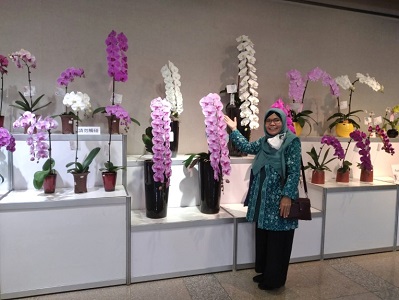Prof Dewi Sukma has Crossed Phalaenopsis Orchids

IPB University Orchid Expert, Prof Dewi Sukma, conducted a crossbreeding of Phalaenopsis orchids, a type of interest to orchid lovers. Several genotypes resulting from these crosses have been registered under the names Phalaenopsis (Phal) Venera IPB, Phal Mentari IPB, Phal Kirana IPB, and Phal Humaira IPB.
She has carried out various research on orchid development in an effort to encourage the development of orchid species that are in demand by the market. This is because most of the orchids for the Indonesian market are imported from Thailand (61,66 percent) and Taiwan (35,28 percent). Thailand is the main producer and exporter of Dendrobium and Vanda, while Taiwan is the main producer and exporter of Phalaenopsis.
“High imports in Indonesia show that the domestic market for orchids is quite high and cannot be fulfilled by domestic producers. Thus, increasing the production of domestic orchid seeds with types that meet market tastes still needs to be increased,” said Prof Dewi when explaining her research at the Press Conference of the Pre-Scientific Oration of IPB University Professors via Zoom Meeting, Wednesday (27/7).
The orchid derivatives it produces have novelty characters and are fragrant, but crosses with species cannot produce large flowers as are the favorites in the orchid market. The size of these interspecies hybrids or hybrid crosses with species that still have small flowers needs to be increased in size through an in vitro biotechnology approach.
Not only that, research on orchids with crosses between hybrids with large flowers was also carried out to obtain derivatives with large flowers. One such cross was between Phal ‘Timothy Christopher’ x Phal ‘Leopard Prince’. One of the genotypes derived from these crosses has been registered under the name Phal ‘Safira IPB”.
At the press conference, Prof Dewi explained the material ‘Cellular and Molecular Biotechnology to Support the Breeding and Provision of Phalaenopsis Orchid Seeds’. According to her, a biotechnology approach is needed to support orchid breeding.
“Orchid propagation from seed sowing to growing seedlings requires an in vitro tissue culture laboratory. Orchid seed germination in nature requires the help of symbiotic microbes. In vitro tissue culture media in the laboratory can replace the role of symbiotic microbes and even increase germination success,” she explained.
“Seed germination media optimization has been carried out in the laboratory for Phalaenopsis so that it can encourage germination and better seedling growth to produce quality seeds. Various other approaches through plant biotechnology can be carried out to support the development of orchids,” she continued.
Prof Dewi revealed that some of the obstacles faced in the development of orchids in Indonesia were the limited number of breeders for the development of new varieties. The slow mastication of the product is also an obstacle to placing the orchids produced in meeting market needs.
“In addition to the dependence on production support facilities that still have to be imported, as well as the need for large investments in orchid agribusiness. Orchids also take a long time (6-7 years) to produce new varieties,” she said.
Because of that, she said, it takes passion, perseverance, capital, patience, consistency, and endurance to develop it. “Support with various parties to encourage the development of Indonesian orchids is needed,” concluded Prof Dewi. (dh/Rz) (IAAS/SHY)



